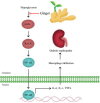The effects of ginger and its constituents in the prevention of metabolic syndrome: A review
- PMID: 35949312
- PMCID: PMC9320212
- DOI: 10.22038/IJBMS.2022.59627.13231
The effects of ginger and its constituents in the prevention of metabolic syndrome: A review
Abstract
Metabolic syndrome is a multifactorial disorder characterized by hyperglycemia, hyperlipidemia, obesity, and hypertension risk factors. Moreover, metabolic syndrome is the most ordinary risk factor for cardiovascular disease (CVD). Numerous chemical drugs are being synthesized to heal metabolic risk factors. Still, due to their abundant side effects, herbal medicines have a vital role in the treatment of these abnormalities. Ginger (Zingiber officinale Roscoe, Zingiberaceae) plant has been traditionally used in medicine to treat disorders, including CVD. The unique ginger properties are attributed to the presence of [6]-gingerol, [8]-gingerol, [10]-gingerol, and [6]-shogaol, which through different mechanisms can be beneficial in metabolic syndrome. Ginger has a beneficial role in metabolic syndrome treatment due to its hypotensive, anti-obesity, hypoglycemic, and hypolipidemic effects. It can significantly reduce atherosclerotic lesion areas, VLDL and LDL cholesterol levels, and elevate adenosine deaminase activity in platelet and lymphocytes. Also, it promotes ATP/ADP hydrolysis. In the current article review, the critical properties of ginger and its constituents' effects on the metabolic syndrome with a special focus on different molecular and cellular mechanisms have been discussed. This article also suggests that ginger may be introduced as a therapeutic or preventive agent against metabolic syndrome after randomized clinical trials.
Keywords: Diabetes; Dyslipidemia; Ginger; Hypertension; Metabolic syndrome; Obesity; Zingiber.
Conflict of interest statement
The authors declare not to have any conflicts of interest.
Figures





Similar articles
-
Beneficial effects of ginger Zingiber officinale Roscoe on obesity and metabolic syndrome: a review.Ann N Y Acad Sci. 2017 Jun;1398(1):83-98. doi: 10.1111/nyas.13375. Epub 2017 May 15. Ann N Y Acad Sci. 2017. PMID: 28505392 Review.
-
Promising influences of gingerols against metabolic syndrome: A mechanistic review.Biofactors. 2022 Sep;48(5):993-1004. doi: 10.1002/biof.1892. Epub 2022 Oct 3. Biofactors. 2022. PMID: 36191294 Review.
-
Pharmacokinetics of 10-gingerol and 6-shogaol in the plasma of healthy subjects treated with red ginger (Zingiber officinale var. Rubrum) suspension.Biomed Rep. 2018 Dec;9(6):474-482. doi: 10.3892/br.2018.1163. Epub 2018 Oct 23. Biomed Rep. 2018. PMID: 30546874 Free PMC article.
-
Ginger from Farmyard to Town: Nutritional and Pharmacological Applications.Front Pharmacol. 2021 Nov 26;12:779352. doi: 10.3389/fphar.2021.779352. eCollection 2021. Front Pharmacol. 2021. PMID: 34899343 Free PMC article. Review.
-
Ginger and Heart Health: From Mechanisms to Therapeutics.Curr Mol Pharmacol. 2021;14(6):943-959. doi: 10.2174/1874467213666201209105005. Curr Mol Pharmacol. 2021. PMID: 33297926 Review.
Cited by
-
A herb mixture to ameliorate non-alcoholic fatty liver in rats fed a high-fat diet.Heliyon. 2023 Aug 2;9(8):e18889. doi: 10.1016/j.heliyon.2023.e18889. eCollection 2023 Aug. Heliyon. 2023. PMID: 37576314 Free PMC article.
-
Inhibitors of ATP Synthase as New Antibacterial Candidates.Antibiotics (Basel). 2023 Mar 24;12(4):650. doi: 10.3390/antibiotics12040650. Antibiotics (Basel). 2023. PMID: 37107012 Free PMC article. Review.
-
Hepatoprotective effects of gentisic acid through its anti-oxidant properties in nicotinamide-streptozotocin induced diabetic mice.Iran J Basic Med Sci. 2023;26(12):1409-1415. doi: 10.22038/IJBMS.2023.70659.15359. Iran J Basic Med Sci. 2023. PMID: 37970436 Free PMC article.
-
Plant-Derived Nutraceuticals Involved in Body Weight Control by Modulating Gene Expression.Plants (Basel). 2023 Jun 11;12(12):2273. doi: 10.3390/plants12122273. Plants (Basel). 2023. PMID: 37375898 Free PMC article. Review.
-
Effects of Tinospora cordifolia (giloy) on metabolic syndrome components: a mechanistic review.Naunyn Schmiedebergs Arch Pharmacol. 2025 May;398(5):4979-5009. doi: 10.1007/s00210-024-03642-2. Epub 2024 Dec 28. Naunyn Schmiedebergs Arch Pharmacol. 2025. PMID: 39731594 Review.
References
-
- Alberti KGMM, Zimmet P, Shaw J. The metabolic syndrome; a new worldwide definition. Lancet. 2005;366:1059–1062. - PubMed
-
- Després J-P, Lemieux I. Abdominal obesity and metabolic syndrome. Nature. 2006;444:881–887. - PubMed
-
- Fumeron F, Lamri A, Khalil CA, Jaziri R, Porchay-Baldérelli I, Lantieri O, et al. Dairy consumption and the incidence of hyperglycemia and the metabolic syndrome: Results from a French prospective study, Data from the Epidemiological Study on the Insulin Resistance Syndrome (DESIR) Diabetes Care. 2011;34:813–817. - PMC - PubMed
Publication types
LinkOut - more resources
Full Text Sources
Research Materials
